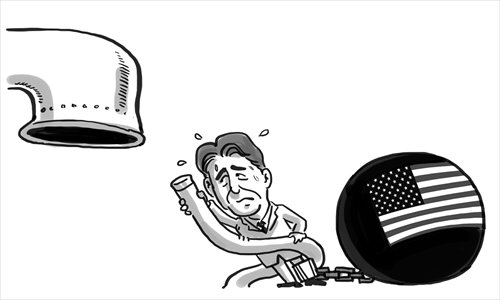HOME >> OP-ED
Abe’s resource-seeking flops in Russia
By Jiao Kun Source:Global Times Published: 2014-10-23 18:58:02

Illustration: Liu Rui/GT
According to Kyodo News, Alexei Miller, CEO of the Russian state gas company Gazprom, said recently that his company may cancel the joint development of liquefied natural gas bases in the Russian Far East with Japanese companies.
Before that, there had been reports saying that natural gas produced at the large-scale gas field that Gazprom plans to build in eastern Siberia would only be exported to China.
The Chinese website of Nikkei cited a vice president of Gazprom, saying that currently it is not necessary to connect two gas fields to Vladivostok, where there is already a base exporting gas to Japan.
If these reports are true, they indicate that Japan's resource diplomatic policy has failed. This undoubtedly deals a heavy blow to Japanese Prime Minister Shinzo Abe, who has been enthusiastic about developing Japan-Russia ties.
The two countries have a long history of energy cooperation. With abundant oil and gas reserves in the Far East region, Russia is surrounded by big energy consumers such as China, Japan and South Korea, and sees expanding the Far East market as an important way to increase fiscal revenues.
Meanwhile, Russia hopes to introduce technology and investment from developed countries like Japan to develop its Far East.
As early as the 1970s, the Soviet Union proposed a plan to work with Japan in developing the oil and natural gas in Sakhalin.
In the 21st century, Japanese enterprises took part in the construction of the Sakhalin-1 and Sakhalin-2 projects, and Russia started exporting oil and liquefied natural gas to Japan.
Tokyo and Moscow began negotiations on jointly developing the Russia's eastern Siberian gas fields after Japan's demand for natural gas skyrocketed due to the Fukushima nuclear disaster in 2011.
Abe also showed a passion for developing economic and diplomatic relations with Russia when he took office in 2012.
He led a large delegation to Moscow in the end of April last year, becoming the first Japanese prime minister that visited Russia in the decade.
He held talks with Russian President Vladimir Putin for over two hours in the Kremlin, and the two sides released a statement on developing partnership.
Abe's trip was accompanied by representatives of more than 100 Japanese enterprises, including energy tycoons.
Abe also stressed developing a private relationship with Putin, and several talks have been held. He even attended the opening ceremony of the 2014 Winter Olympic Games in Sochi in February when the heads of many Western states refused.
It seems to be natural that with these efforts, the energy cooperation between Japan and Russia would go smoothly. The sudden turnaround may astound many. But those familiar with geopolitics and Abe's record may not find this a big surprise.
In fact, Japan and Russia face many obstacles in developing their diplomatic relations. Briefly at war during the last weeks of WWII, the two countries haven't technically signed a comprehensive peace treaty.
A more serious and direct obstacle is the territorial dispute. Japan claims that Russia has occupied its Northern Territories, known as the Southern Kuriles in Russia, and asks for a return of all the islands there. Japan has turned down a Russian proposal to return part of the islets.
On this issue, Japan's hawkish prime minister is unlikely to change the stance of the government. Even if Abe wants to solve the territorial issue by stepping up economic and energy cooperation with Russia, the domestic opposition won't allow him to.
Abe's performance since he became prime minister again showed that his foreign policies and diplomatic activities lack a clear strategy and stern guiding principle, despite their large scale.
Abe intended to showcase his own abilities, but failed to revise the traditional diplomatic strategy and self-orientation of the country.
For Abe, boosting ties with Russia is merely an expedient way to chase short-term interests, rather than a long-term guideline for Japanese diplomacy.
Besides Japan's desire for energy, Japan wants to get closer with Russia also because Tokyo's relations with two East Asian neighbors, South Korea and China, are escalating.
But such a diplomatic relationship based on short-term interests, is certainly not reliable. Traditionally Japan is an important ally of the US, and it positions itself in the Western group. On significant international issues, it always follows the pace of the EU and the US.
Amid the sharp confrontation between Russia and the US-led West caused by the Ukrainian crisis, Abe ultimately chose to join the Western camp to sanction Russia, which made his previous efforts to cater to Moscow futile.
In fact, just two weeks before he visited Russia in April 2013, he released a joint statement with NATO to further consolidate cooperation.
Putin's Japan trip, originally scheduled for this autumn, hasn't been settled. This is an implication that individual relationships between state leaders can in no way replace their nation's strategic interests.
The author is a lecturer at the School of History, Wuhan University. opinion@globaltimes.com.cn
Posted in: Viewpoint